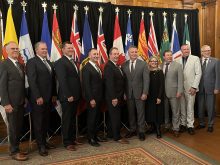SASKATOON – A revamped Canadian Wheat Board has the potential to spur major changes in grain marketing policies, says a former member of the Western Grain Marketing Panel.
“I think producers are underestimating the effect that governance changes will have on the wheat board,” said John Pearson, a vice-president of Alberta Wheat Pool.
The government has said it will adopt the panel’s recommendations that the board be run by a board of directors with a majority of elected farmers, reporting to a chief executive officer.
Read Also

Canola support gets mixed response
A series of canola industry support measures announced by the federal government are being met with mixed reviews.
Some critics who wanted more radical wheat board reforms have dismissed the new governance structure as mere tinkering.
But Pearson said changes must be seen in combination with the government’s plan to bring in enabling legislation that will allow the new board to change grain marketing rules without first getting approval from the government.
“I think changing the governance structure to a board of directors and making the CWB legislation more enabling are huge steps to modernizing the board,” he said. “Who knows what the end result of this might be?”
The board will be more directly accountable to farmers and be able to respond more quickly to shifts in the marketplace, said Pearson: “If the Western Canadian grain industry is able to put good qualified people on that board of directors, I think there’s lots of potential for success.”
Fellow panelist Jack Gorr, a farmer from Three Hills, Alta., agreed the governance changes have “the potential to be significant.”
But he said it will depend on details, such as who farmers elect to the board of directors. If the elections go like the advisory committee elections and produce directors who believe in the status quo, governance changes may not mean much.
He added that changing the board’s governance probably received broader support than any other single issue at the panel’s town hall meetings.
Meanwhile, Pearson said he doesn’t agree with those who have criticized Goodale for ignoring the panel.
While the government didn’t adopt the panels’ recommendations to put put feed barley and some wheat on the open market, it did in areas like governance and increased marketing flexibility.
“I think we had an impact,” said Pearson. “It has been a useful process. If (Goodale) had done nothing and not put a panel together, I don’t think the end result would have been nearly as satisfying.”
And he had no criticism of the minister for not consulting directly with the panel after it had released its report. The panel was ready to meet him, but that was strictly up to him.
Gorr said the panel discussed a vote on barley marketing but decided that wasn’t the panel’s job.
“Voting is something politicians should decide on and not panels,” he said.














